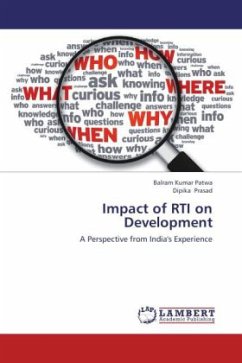The contemporary times have witnessed extensive Rights Activism in the Indian legal and social paradigms, pursuant to the enactment of the Right to Information Act by the Indian Parliament in the year 2005. India being the largest democracy of the world essentially requires transparency in the government procedures in order to achieve two fold expedience, primarily to exhibit the faith in its citizens by performing the functions of a welfare state, along with to achieve the highest standards of governance. The moments of enactment of the RTI Act realized the intention to escalate accountability in the governance on the part of legislators and public servants. Although the Act vests in the citizens a powerful tool to ascertain the functions of the government, it has also encountered various standstills in the government procedure as a result of the deterrence which the Act has created upon the government personnels. This book provides a comprehensive yet holistic approach to the readers facilitating an intensive assessment reached by empirical study of the expediencies brought and the government deadlocks which coexist with the RTI Act.
Bitte wählen Sie Ihr Anliegen aus.
Rechnungen
Retourenschein anfordern
Bestellstatus
Storno








